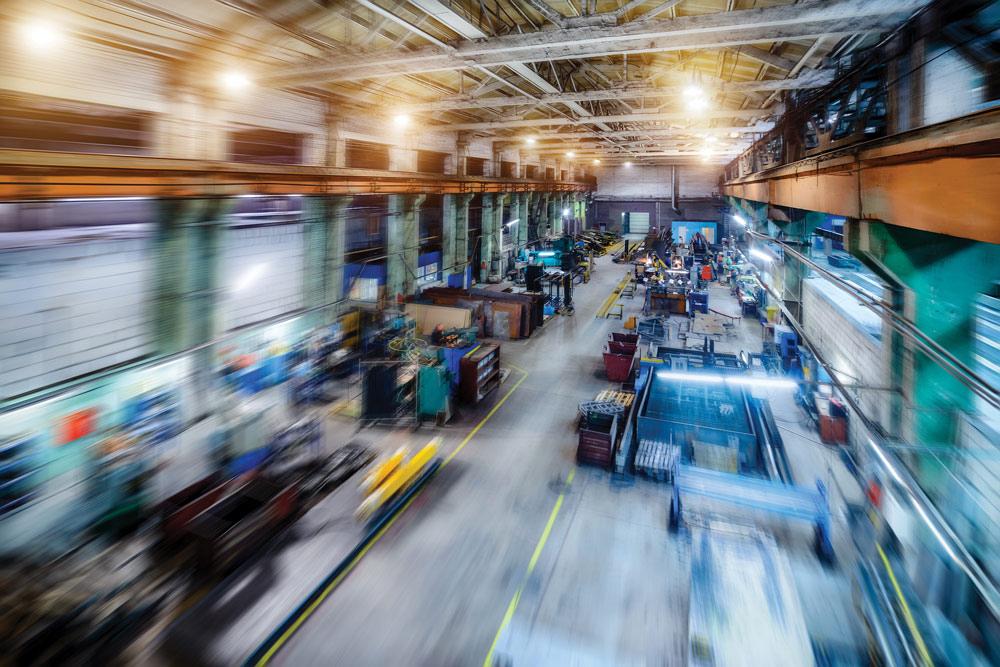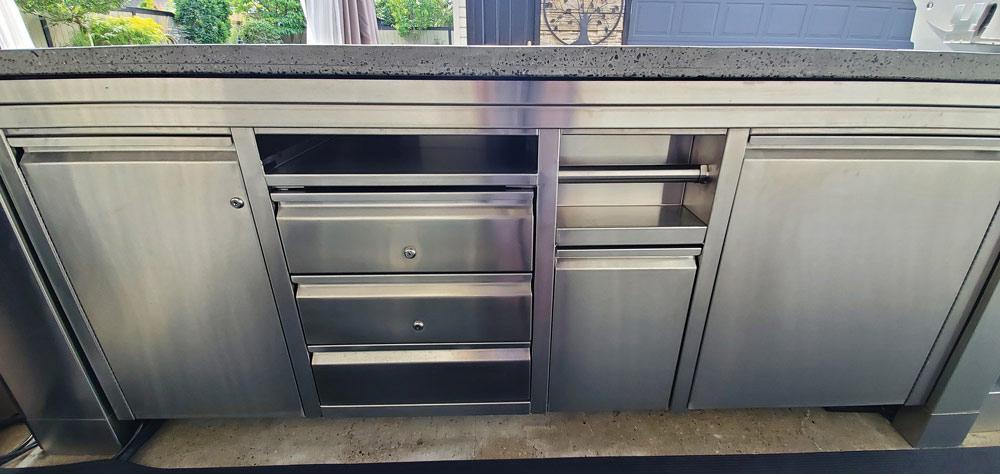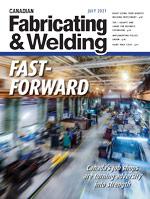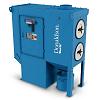Associate Editor
- FMA
- The Fabricator
- FABTECH
- Canadian Metalworking
Canada’s job shops turn adversity into strength
There have been many challenges this past year, but shops from coast to coast have found new and unique ways to weather the storm.
- By Lindsay Luminoso
- August 5, 2021
- Article
- Made In Canada
This last year has been a challenging one. Regardless of where a job shop is located in Canada, the effects of the pandemic have had long-reaching arms and affected everyone to some degree. Some shops found innovative ways to promote business, a few expanded into new markets, while others relied on best practices put in place during previous struggles to weather the pandemic woes.
While the world continues to rebound, more businesses are adjusting to a new normal and finding ways to turn this tumultuous time into opportunity for future success.
Eastern Expansions
"We’ve been really lucky that not a lot really changed in the past few years," said Kent MacLeod, general manager, Kensington Metal Products (KMP), Kensington, P.E.I. "We haven’t had very many slow periods, either, which tended to be a concern about a decade ago. But we are so in tune with the local economy. When a local company in the area closed, we took that opportunity to enter into the seafood industry, designing and manufacturing equipment, which is really different for us."
While the shop had always worked with local farmers, fishermen, and food processing plants, the seafood industry—primarily mussels and oysters—was a new challenge. The shop partnered with a consultant for design work that the shop then manufactures.
"The Maritimes is going through a major change in many industries, and the seafood industry is moving from harvesting to farming," said MacLeod. "We designed a new oyster grading system, computerized equipment that sorts oysters based on size and weight. We have one that we’re just installing now and a second in October. We hope we can continue producing them throughout the Maritimes."
When COVID-19 hit, the shop was unsure what to expect. And while much of the island halted to a standstill for a few weeks in March 2020, most essential businesses remained open and worked together to help each other out.
"We put in COVID measures based on the provincial protocol in the shop, but it didn’t affect us all that much here," said MacLeod. "With the food processing and pharmaceutical plants that we deal with, they had their own protocols in place, so we were able to go into their plants to repair equipment and keep them operational during this time too."
KMP was able to remain open and engaged with its customers throughout the last year, and many of the projects, like a massive shutdown for equipment upgrades at a food processing plant, were able to proceed.
"We were able to continue with that project with different protocols and strategies put in place, which kept everybody employed," said MacLeod. "We worked around the clock, 24 hours per day, basically from January straight through to the end of March this year. And we’re always trying to acquire more welders and fabricators in the shop here, but it’s always a challenge."
In the meantime, KMP continues to keep busy and move forward, as it is now looking at a changeover in its ownership and partnership structure.
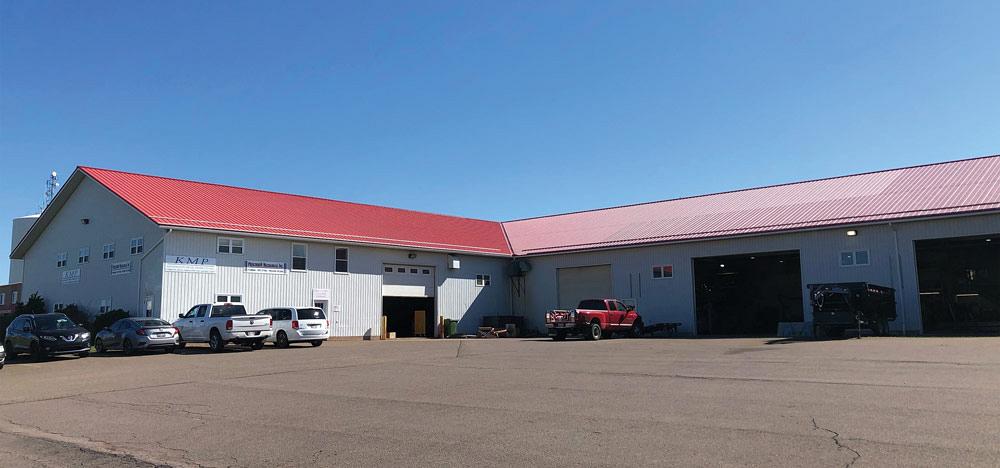
KMP was able to remain open and engaged with its customers throughout the last year, and many of the projects, like a massive shutdown for equipment upgrades at a food processing plant, were able to proceed. KMP
"We’re hoping to bring in younger partners so that we can keep investing and supporting the local community for years to come," said MacLeod.
Central Fluctuation
While some businesses in the Atlantic Bubble, like KMP, managed to find opportunity in new sectors and to expand their businesses, some Ontario shops found the last year to be quite a challenge but found ways to improve effciencies and keep business coming in.
"We saw an increase in raw material costs and decreased availability," said James Bogar, president, Cameron Steel, Lindsay, Ont. "Other challenges we faced included availability of skilled workers, increasing wages, and dealing with the COVID crisis. With that said, we have managed to stay fully open and have not had any cases in our plant."
Bogar credits a lot of the shop’s steadiness with an investment in new equipment and improved productivity on the shop floor. Cameron Steel recently invested in a new, large Toyoda machining centre with dual pallets in an effort to improve quality and efficiency. The shop has been constantly focused on improving efficiencies across all of its manufacturing processes—most of which include upfront, thorough planning before a job hits the floor. The shop also eliminated most of the toolroom and outfitted most of its machining centres with dedicated tooling, even installing a tool-dispensing system to manage inventory.
And while the efficiency gains have helped keep business steady at Cameron Steel, COVID has been a financial burden, especially dealing with all the restrictions and missed days required to follow the regulations.
"Once we worked through our backlog, November 2020 through February of this year was slower. But things have picked up nicely and our backlog is at a good spot," said Bogar. "And now we are looking to purchase an additional large machining centre to process large, round parts. We have a heavy focus on eliminating old and redundant equipment. Scheduling has always been a huge area of concern. Although our on-time delivery is very good, there is too much chaos associated with being on time, which leads to inefficiencies. Tackling scheduling is one of our biggest focuses for this year going forward."
Cameron Steel wasn’t the only shop focused on streamlining efficiencies across the shop floor; Demtool also prioritized productivity.
"We really think that it’s important to focus on efficiency gains, not just with our equipment and software, but all internal processes," said Jim Demerling, fabrication and laser department manager, Demtool Inc., Petersburg, Ont. "And with this we are able to expand our opportunities in industries we are already focused on."
Demtool serves a broad range of industries, but it has been homing in on automation and the robotics customers, as Demerling believes these will be the breadwinners in the future. To serve these customers better, the shop recognized that it needed more complex systems and capabilities to be able to produce all the requirements.
However, this plan initially was stunted as the pandemic took hold in Ontario.
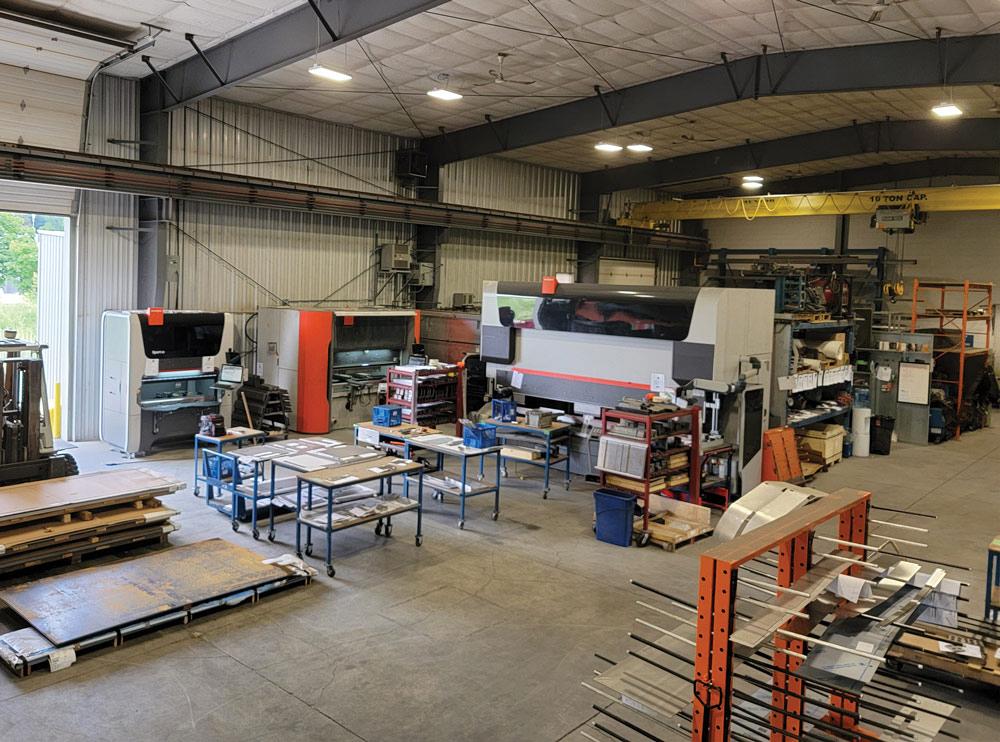
Jim Demerling chalked the shop’s increased business up to positive market factors and its focus on a range of service offerings and turning itself into that one-stop-shop model. Demtool
"Everything initially happened so quickly," said Demerling. "We got really slow and kind of grounded. We then started calling everybody, any customer that we could try to get new opportunities from. We had to adjust pricing to try and be more competitive. Around mid-2020 we were really slowed down. And then by the end of 2020, we couldn’t keep up and that trend is continuing. Right now we can’t keep up with the work load; we’ve been fortunate compared to many other industries."
Demerling chalked a lot of this up to positive market factors and that Demtool focused on a range of service offerings and didn’t rely on just one process, instead turning itself into that onestop-shop model.
"We’re now trying to expand using different strategies within our existing markets, trying to leverage automated estimating processing systems or even the web in different ways that we can," said Demerling. "We want to target some different customer bases, from more like individual hobbyist type of things with automated ways of ordering, rather than just going off after a large company. There’s going to be some custom software development and getting into some things where we have no experience. It’s exciting."
Demerling noted that one thing the pandemic exposed is the need for companies to be more computer-savvy and technologically friendly. Some shops are stuck in their ways, but those that are unwilling to change may be left behind.
Laser Weld Creation (LWC), a Concord, Ont., shop, has always prided itself on being on the forefront of the latest technology. Owner Michael Haimov, who got his start as a welding specialist for the medical industry, saw the limitations associated with traditional welding—lack of accuracy, precision, and durability—which convinced him to quit his job and create a shop dedicated to laser welding.
"The shop first started with a single laser welding machine, and now that we’re a couple years into it, we’ve had quite a few successes," said Ewgeni Isakov, director of business development, Laser Weld Creation.
LWC has a small shop with nine full-time employees and focuses on five industries—automotive, aerospace, medical, military and defence, and battery—and will happily take on any project within the scope.
"Before COVID took over, we were obviously in a different position," said Isakov. "We were doing well but the pandemic hit pretty hard. Considering the far-reaching impact on the service sector, I’d say that the impact on LWC hasn’t been so devastating, but we’ve seen slides in its revenue streams. No company would have been prepared for what transpired in the last 12 months. We have a manageable size team that enabled us to update and execute our safety protocols quickly and effectively while keeping our workers safe. We took steps to ensure that we had little to no downtime. But as things are rebounding, we are happy to report that things are going back to normal for us."
Isakov noted that the shop faced some challenges with maintaining a healthy bottom line, but he credits the skilled staff and the shop’s focus on precision with keeping projects rolling in.
"The bulk of our clients remained engaged with us throughout the pandemic," said Isakov. "There were some shortfalls in there, but we had lots of work and it wasn’t as drastic as experienced by the industry in general. Our goal is to take advantage of the upward trajectory we are on and grow our business beyond pandemic levels. We are always looking to expand, and now we’re concentrating on getting more projects and purchasing new equipment."
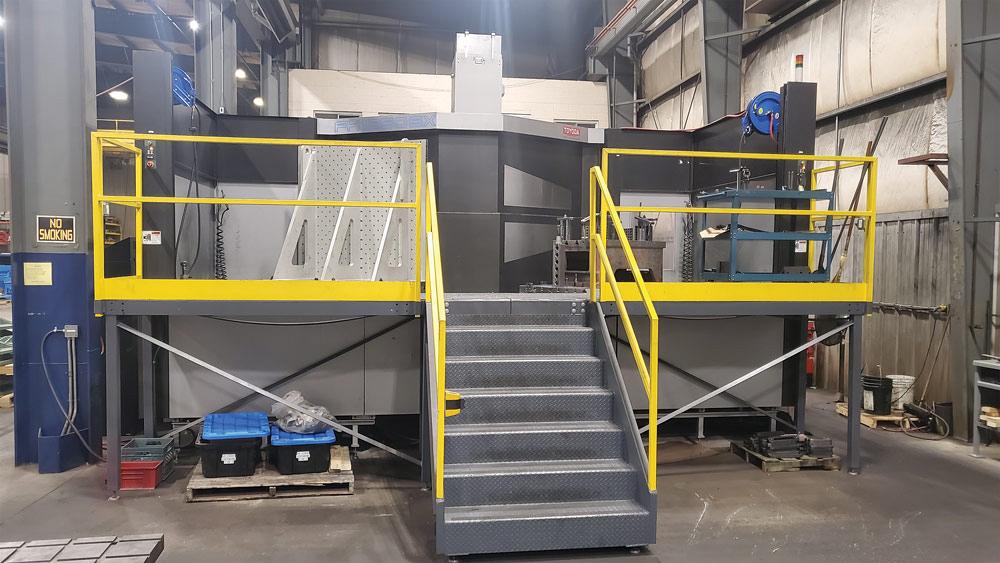
James Bogar credits a lot of the shop’s steadiness with an investment in new equipment as it recently invested in a new, large Toyoda machining centre with dual pallets in an effort to improve quality and efficiency. Cameron Steel
Western Paradox
It’s not news that Alberta has had its fair share of struggles over the past few years. In 2016/17 the economy really hit the skids following oil and gas price crashes. The years that followed were a struggle for many manufacturers in the province, many unable to stay afloat.
"These hardships really forced a lot of shops to adapt to the economic times," said Trent Baird, co-owner, Halbar Stainless Products Ltd., Edmonton, and Halbar Stainless Okanagan Ltd., West Kelowna, B.C. "We had a tough three years preceding the pandemic; we had to lay off employees and were trying to find ways to deal with these challenging times. A lot of companies got involved with workshare programs because there just wasn’t the work in this province as the oil and gas sector suffered. We saw pipeline fights, plummeting oil prices, and a shift to green energy—big changes in a short amount of time."
Many manufacturers found ways to survive the market tumult, utilized less labour and staff, created more efficiencies in production, and developed more processes with existing equipment.
"Then of course the pandemic hit last year and threw the whole world into the same economic turmoil that Alberta had been facing for the last three years," said Baird. "We were adapting and changing processes and our procedures in order to become more efficient, and then COVID came and we all know what happened there. Of course it affected us a bit."
Baird noted that while the initial struggles of the pandemic seemed to be everywhere, the shop’s B.C. location quickly rebounded.
"Our branch in the interior B.C. market, from Okanagan down to the lower mainland, has actually been very busy," he said. "It’s been very positive. The economy in B.C. seems to be a lot different than in Alberta, where we’ve seen such huge fluctuations. However, the economic constraints that we had to deal with actually helped us moving into the pandemic because we already sort of experienced it."
The pandemic exposed just how reliant B.C. and even all of Canada are on outside markets. Outsourcing can only work for so long. It’s important, as manufacturing continues to strengthen, that Canada prioritizes this sector.
"We don’t even have mills to make metal," said Baird. "One of the issues right now in manufacturing is supply chains. Aluminum is really hard to find, and carbon steel mills won’t even give you more than 24 hours on quotes with the cost because they fluctuate so much."
This presents another challenge when it comes to inventory. In tough times it makes sense to move to a just-in-time model to have as little inventory as possible on the balance sheet, but supply chain problems can cripple a business when it can’t even get the raw materials to compete for jobs.
"We’re using social media a little bit more to get more exposure," said Baird. "We really started to look at what we weren’t doing before and what we can do to improve. We are living in a very technologically, social media-motivated world. Technology savviness has increased dramatically because the pandemic made it necessary. A lot of companies aren’t comfortable in this space, but we’ve made it a priority. We’ve got to look after ourselves, be more trustworthy, find out how we can do better, and promote ourselves."
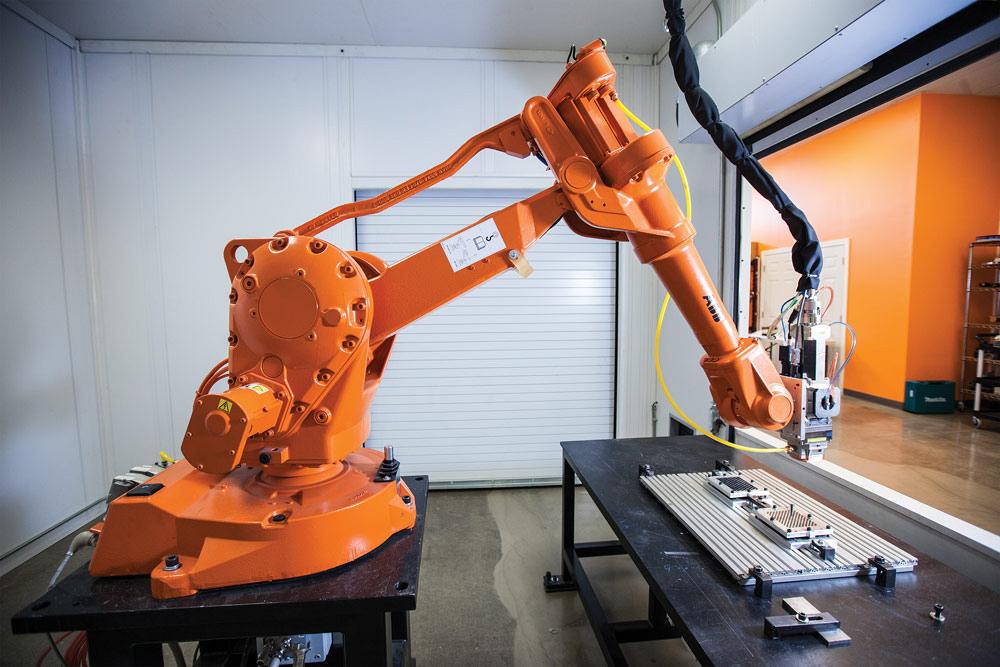
LWC is focusing on supporting its customers in the automotive, aerospace, medical, military and defence, and battery sectors and will happily take on any project within this scope. LWC
Associate Editor Lindsay Luminoso can be reached at lluminoso@canadianfabweld.com.
Cameron Steel, cameronsteel.com
Demtool, demtool.com
Halbar Stainless Products Ltd., halbarstainless.com
Kensington Metal Products, www.kensingtonmetalproducts.com
Laser Weld Creation, laserweldcreation.com
About the Author

Lindsay Luminoso
1154 Warden Avenue
Toronto, M1R 0A1 Canada
Lindsay Luminoso, associate editor, contributes to both Canadian Metalworking and Canadian Fabricating & Welding. She worked as an associate editor/web editor, at Canadian Metalworking from 2014-2016 and was most recently an associate editor at Design Engineering.
Luminoso has a bachelor of arts from Carleton University, a bachelor of education from Ottawa University, and a graduate certificate in book, magazine, and digital publishing from Centennial College.
subscribe now


Keep up to date with the latest news, events, and technology for all things metal from our pair of monthly magazines written specifically for Canadian manufacturers!
Start Your Free Subscription- Industry Events
Automate 2024
- May 6 - 9, 2024
- Chicago, IL
ANCA Open House
- May 7 - 8, 2024
- Wixom, MI
17th annual Joint Open House
- May 8 - 9, 2024
- Oakville and Mississauga, ON Canada
MME Saskatoon
- May 28, 2024
- Saskatoon, SK Canada
CME's Health & Safety Symposium for Manufacturers
- May 29, 2024
- Mississauga, ON Canada













